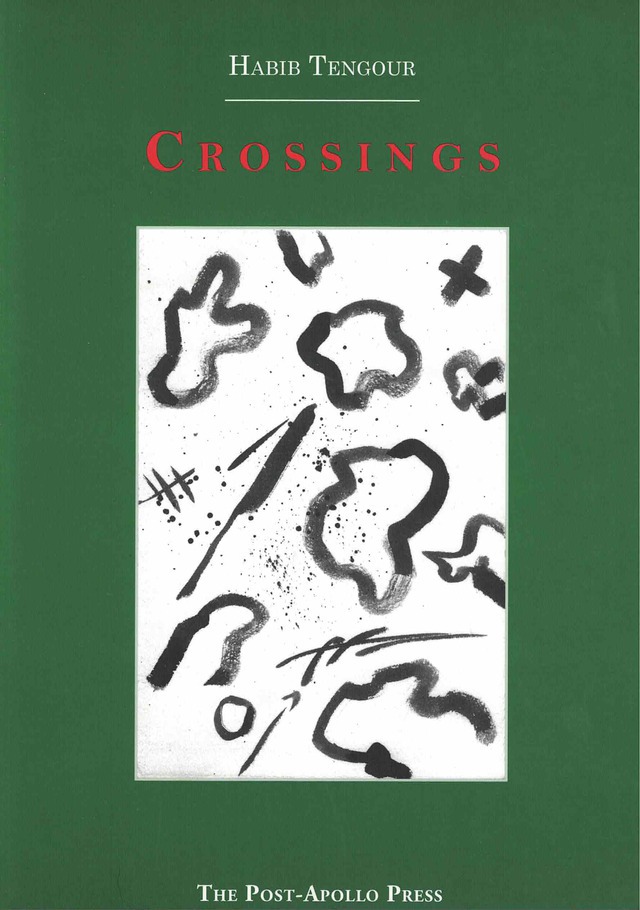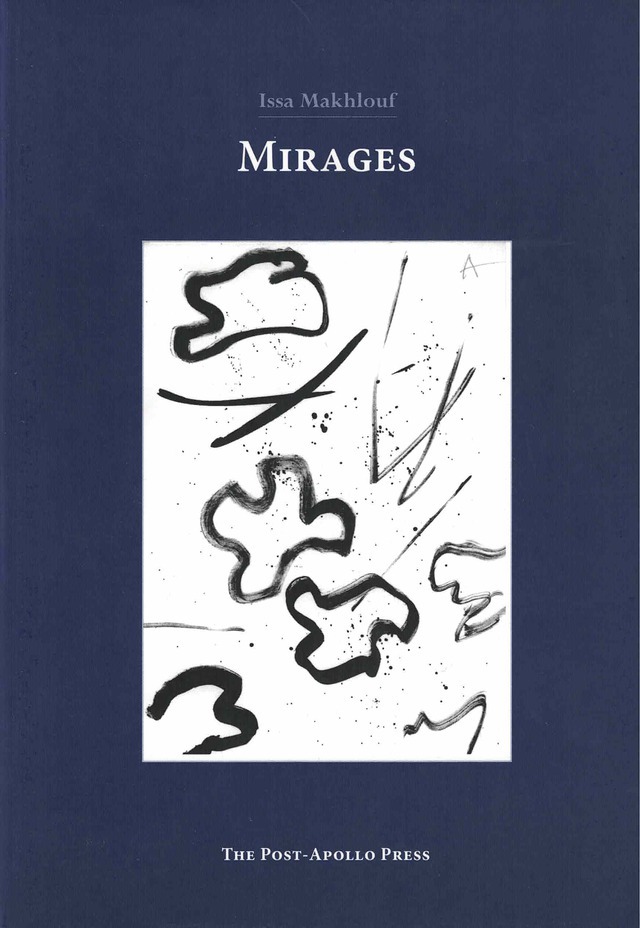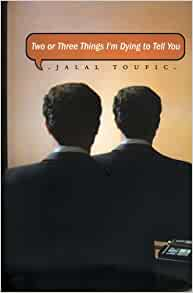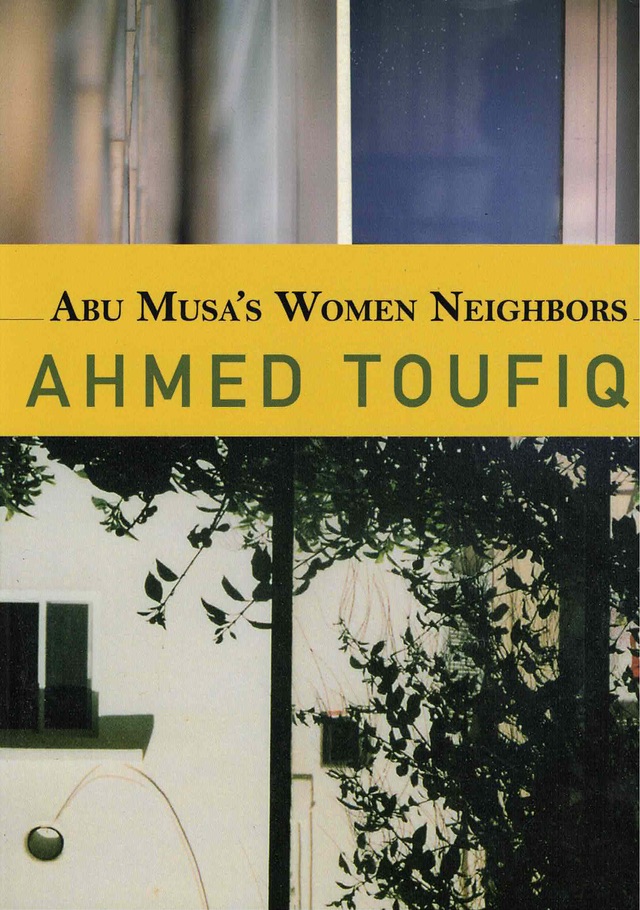Features reviews, discussion questions, and writing exercises for Crossings by Habib Tengour, Mirages by Issa Maklouf, Two or Three Things I’m Dying to Tell You by Jalal Toufic, and Abu Musa’s Women Neighbors by Ahmed Toufic.
Jump to: Book Descriptions · Lesson Planning · Supplementary Materials · Contributor Bios
Crossings
By Habib Tengour
Poetry. Middle Eastern Studies. Translated from the French by Marilyn Hacker.
Praise for Crossings
Beginning with the astonishing prologue poem, “Conversation with Mohammed Dib,” followed by four long, spectacular poems, each a small book in itself, Habib Tengour’s Crossings takes us through various, lavishly depicted, geographical, political, historical, spiritual, moral, and aesthetic spaces that we’ve never been in before. “My tribe that cannot be worn down continues,” the poet says. His tribe being—in Ezra Pound’s phrase describing poets—“the antennae of the race.” Crossings is an amazing book by a brilliant poet, amazingly and brilliantly translated by Marilyn Hacker, who is at her characteristic best, which is the best.
— Lawrence Joseph
Mirages
By Issa Maklouf
Poetry. Middle Eastern Studies. Translated from the Arabic by Alicia F. Lam. This is the first full length English-language translation of the beautifully crafted prose poems of Issa Makhlouf.
Two or Three Things I’m Dying to Tell You
By Jalal Toufic
Cultural Writing. “What was Orpheus dying to tell his wife, Eurydice? What was Judy dying to tell her beloved, Scottie, in Hitchcock’s Vertigo? What were the previous one-night wives of King Shahrayar dying to tell Shahrazad? What was the Christian God “dying” to tell us? What were the faces of the candidates in the 2000 parliamentary election in Lebanon “dying” to tell voters and nonvoters alike? While writing (Vampires): An Uneasy Essay on the Undead in Film and Undying Love, or Love Dies, I, a mortal to death, was dying to tell these books’ readers and myself about diegetic silence-over, which produces a dead stop and reveals the occasional natural immobilization of the living as merely a variety of movement; and an unreality that sometimes behaves in a filmic manner, inducing the undead to wonder: “Am I in a film?”; as well as a significant number of other anomalies” — Jalal Toufic.
Praise for Two or Three Things I’m Dying to Tell You
Resurrection through simulation—an end time fantasy in real time. The graves open… The dead walk… Toufic is a sort of postructuralist spiritualist, a critical medium for the peculiar specters that haunt the society of the spectacle.
— Ben Lerner for First Intensity, #21, 2006
Jalal Toufic is an amazing writer. He documents the moves of consciousness in a way that leads the reader ever deeper, from impasse to illusion to new impasse—turning the trap of ‘what can’t be named’ into a true paradise.
— Richard Foreman
Abu Musa’s Women Neighbors
By Ahmed Toufic
In fourteenth-century Morocco, Shamah works as a servant in the house of Chief Judge Ibn al-Hafid. She is a favorite of the judge’s senior wife, Al-Tahirah, who takes the beautiful young woman under her wing. Thus, Shamah becomes quite accomplished in many things, such as household management,literary and legal matters, and politesse. Those skills, along with her physical beauty, garner her a surprise marriage proposal from Supreme Judge Abu Salim al Jawra’i. The wedding is arranged posthaste, and before she knows what hit her, the former servant girl is herself ordering servants around in a fine home, surrounded by beautiful things. Conditions of her life change rapidly, and before very long, Shamah, widowed by al-Jawra-i, falls in love with the handsome Andalusian mosaic craftsman ‘Ali Sancho. They are married and move into the city’s Oil Hostelry, where Shamah feels an inexplicable bond with their neighbor, the reclusive mystic Abu Musa. It is there that corruptive power, insatiable greed, and religion clash with mysticism in Toufiq’s fascinating novel.
— Donna Chavez, American Library Association
Praise for Abu Musa’s Women Neighbors
Abu Musa’s Women Neighbors is an unforgettable book. Just as Abu Musa, its silent protagonist, steps out of the story in the last paragraph only to live on, in the physical site of his burial as in the spiritual life of the city, Toufiq’s moving text is animated by the echo of lives and events that live on, as if narrated from the perspective of another world. Sidi Musa’s sanctuary stands today overlooking the ocean, a site of healing in the midst of a poor urban sprawl; the retelling of this 14th Century tale spills out into the present, summons us.
Writing Exercises
- Stage a reading or act out a poetic scene that you write on your own. Have it be in conversation with one of the plays you read.
- Choose a scene from each of the plays and stage and act it out.
- Choose another scene, or the same from before, and change up the stage directions. What effect does this have on the story, the dialogue, the poetics in the scene, and the plays as a whole?
- Take lines throughout all three books and collage them into a poem. Turn the poem into a scene to be acted out.
- Research other poems or plays that parallel some or all three books, and write three or four pages about how they relate, what they say about contemporary literature, and how they can inform readers about modern issues
Discussion Questions
- How do characters and narrative place the plays within a contemporary context?
- What do poetics add to dialogue? Detract? Speak specifically toward formal techniques.
- What are some vessels for movement throughout the plays? Compare to other texts and/or common writing techniques..
- The subject of death recurs throughout many of these plays. How does each playwright think of death? Is it its own character? Are their ideas of death new or historical?
- Go back through and take note of the stage directions throughout the plays. How does the interpretation of these elements affect the play as a whole? How do they shift mood and story? How many ways can a single direction be interpreted?
- Many of these plays have characters in the form of an emotion or object. How is this different than a traditional character? Is it? What purpose does this serve in the context of the contemporary?
- In Non-Sequitur, short scenes with many different, dissonant voices replace a traditional method of several recurring characters. Along with the topics that the voices speak toward, how do you think this method deconstructs and/or builds upon life and events in the modern age?
- Write two quick scenes using sparse setting and characters that are either objects or emotions of characters. These scenes should showcase a grasp of narrative and one’s ability to employ comparison and contrast..
- In Camille Roy’s Bye-Bye Brunhilde, the character TECHNIQUE says, “Whatever doesn’t stick to your body is a word.” What do you think this means in regards to writing dialogue, writing a poem, living life? Can you think of another piece of literature that “doesn’t stick to your body”?
- Roy’s plays critique the social norm and common structures of relationships. What are some sentiments that might still echo about today’s norms or structures since their publication in 1993? How have the sentiments changed at all?
Links
The Relationship
Non-Sequitur Excerpt on Vimeo
Captain Phillips
The Immortal Life of Henrietta Lacks
Interview with Camille Roy on Jacket2
Relevant News
Chelsea Manning: Wikileaks source and her turbulent life
Chelsea Manning leaves prison
The Man Who Spilled The Secrets : Julian Assange
Somali Pirate Asks Forgiveness, Sentenced To Nearly 34 Years in Prison
A Grounded Soul: Saint-Exupery in New York
Henrietta Lacks
On Microaggressions and Women
On Lesbian Literature
Joyelle McSweeney
Joyelle McSweeney is the author of three books of poetry and three books of prose, most of which also contain plays. Her most recent titles include The Necropastoral: Poetry, Media, Occults, a book of transnational, transgenre poetics essays (University of Michigan’s Poets on Poetry Series, 2015), Dead Youth, or, The Leaks (Litmus Press, 2014), Salamandrine, 8 Gothics (Tarpaulin Sky Press, 2013), and Percussion Grenade (Fence, 2012). She is a founder of the international press Action Books and a contributor to the culture site Montevidayo.org. She teaches at the University of Notre Dame.
Khadijah Queen
Khadijah Queen is the author of Conduit (Black Goat/Akashic Books 2008); Black Peculiar, winner of the 2010 Noemi Press book award and published in 2011; and Fearful Beloved (Argos Books 2015). Her chapbooks are Exercises in Painting (Bloof Books 2016), I’m So Fine: A List of Famous Men & What I Had On (Sibling Rivalry 2013), No Isla Encanta (2007) and bloodroot (2015), both from Dancing Girl Press. She won the 2014 Leslie Scalapino Award for Innovative Performance Writing and has held residency fellowships from Cave Canem, Squaw Valley Community of Writers and the Norman Mailer Center in Provincetown. Since 2008, she has curated the annual reading series Courting Risk, which focuses particularly on women and LGBTIQ writers working in multiple genres. She serves as core faculty in poetry and playwriting for the low-residency Mile-High MFA in creative writing at Regis University and serves as board chair for the feminist publisher Kore Press.
Camille Roy
Camille Roy is a writer and performer of fiction, poetry, and plays. Her books include Sherwood Forest (Futurepoem, 2011); a play, Cheap Speech (Leroy, 2002); and a fictional autobiography Craquer (2nd Story, 2002); two novellas collected as Swarm (Black Star Series, 1998); The Rosy Medallions (Kelsey Street Press, 1995); and two plays collected as Cold Heaven (O Books, 1993). She also co-edited Biting The Error: Writers Explore Narrative (Coach House, 2005, reissued 2010) and was a founding editor of the online journal Narrativity. Roy has taught creative writing at San Francisco State University, California State University Summer Arts, and Naropa University. She lives and works in San Francisco.




